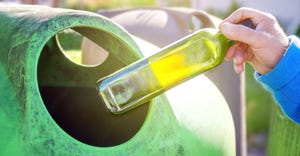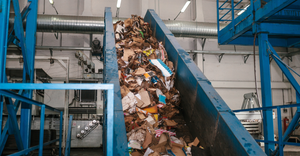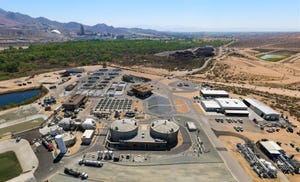Episode 106: Using Science to Find Solutions for Circularity
You are in for a ride in this week’s NothingWasted! podcast with Marcus Eriksen, author, scientist, marine and co-founder of Leap Lab and The 5 Gyres Institute.
Leap Lab is a network of science centers committed to building self-reliant communities. The 5 Gyres Institute is a leader in the global movement against plastic pollution with more than 10 years of expertise in scientific research and engagement on plastic pollution issues; it has taken 19 research expeditions in all five subtropical gyres as well as many of the world’s lakes and rivers, in search of plastic.
We spoke with Eriksen about the role of the waste industry in fostering circular economies, turning science into policy, sailing across the ocean in a plastic-bottle boat and more.
Here’s a sneak peek into the discussion:
Waste360: Could you please introduce yourself and tell us what fuels your passion for the important work you are doing?
Eriksen: I’m a marine scientist who works on plastic pollution in the world’s oceans. And that work has really expanded to look at the global impact of plastics on our ecosystems, human health, the economy — and really what the solutions are, going forward.
My background in this goes back a few decades. I grew up just outside New Orleans, where I developed a love for nature. After high school, I joined the Marine Corps and found myself in the first Gulf War. I was among all the burning oil wells in Kuwait City, and my conservation ethic really came back to me, questioning why are we here, what are we doing, what is this addiction to fossil fuels? The full cost of fossil fuels is pretty horrific. While I was there, I thought to myself, ‘If I survive this war, I want to raft to the Mississippi River.’ And I did it 13 years later — and I saw an unending trail of plastics.
Waste360: Can you tell us more about your work through The 5 Gyres Institute?
Eriksen: The 5 Gyres Institute is really about ocean plastics. What we saw about 10 years ago was a big gap in the data on ocean plastics. There were questions about how much trash is out there, where is it, and what is the impact? We set sail on our first expedition in 2008, and since then we’ve done the equivalent of sailing around the world twice, just studying ocean plastics to answer those questions.
In 2013, we were in the Great Lakes and discovered plastic microbeads, and that kind of set us on this policy trajectory. We can really pinpoint where this product is coming from, and this helped us launch a policy campaign along with about 50 other organizations, which led to the signing the Microbead-Free Waters Act. So that’s what 5 Gyres does; we turn science into policy. Right now we’re looking at a few different things including plastics in asphalt and bioplastics.
Waste360: And how about Leap Lab?
Eriksen: Leap Lab is about science literacy. We have seen what can happen when we’re not using science as a foundation for policy and public conversations. So we are building a science center in Ventura County, California to house a lot of exhibits that we have. It will have a much more research-based, progressive mission than your typical science center.
Waste360: I know you’re working on the single-use plastics issue. Can you tell us more about your work on that topic?
Eriksen: Yes, single-use plastics is a main issue we are trying to address. And during this Covid time, we’re still pushing for policies. We have a program called Reusable LA, which is a coalition of Los Angeles-based organizations, trying to shift the city away from single-use to reuse. And we’re actually busier now than ever during Covid.
Waste360: Do you have any advice for people who want to do their part to help overcome the plastics crisis — especially people who may think ‘I’m just one person, what can I do?’
Eriksen: That’s a good question, and I often say that, first of all, one person is not going to change the whole world. But a group of people will. So my advice is ‘get organized.’ If you’re passionate about this and want to contribute, look for organizations that are helping with this issue, and you can contribute to them your time and money. And, average citizens can call their local leaders to support bills that address the plastics problem. Also, people can look at their spheres—their kids’ schools; their business; their home—and try to zero-waste their lifestyle and operations. How can you get rid of single-use spoons at your kids’ cafeteria and water bottles at your office? There are a lot of little things that people can do.
#NothingWastedPodcast
About the Author
You May Also Like




